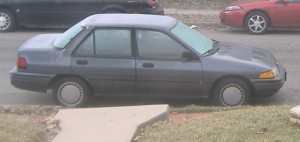The Importance of Frugality in Building Wealth
I was up until 6:30 this morning reading Stop Acting Rich … By Thomas J. Stanley, Ph.D., the author of the incredibly successful The Millionaire Next Door and The Millionaire Mind. It’s remarkable because so much of what the “average” millionaire did to achieve his or her wealth mirrors what I, and members of my own family, did to become financially independent. The premise of the book is that most people get into financial trouble trying to emulate the purchasing patterns of the wealthy, yet don’t try to emulate the financial assets that allow them to spend that kind of money without financial stress. In other words, people want the “badge of success”, such as the Mercedes S600, but not the success itself, such as owning three hotels worth $14.2 million that generates $1.5 million in pre-tax profits whether or not the owners get out of bed in the morning.
Here, I had a huge advantage in my family culture. I have members of both sides of my family who still live in the same house they bought 25 or 30 years ago and have had it long paid off completely, drive nice, older model cars, and pour a large percentage of their income into investments such as rental houses, privately controlled businesses, stocks, bonds, mutual funds, car washes, etc. Over time, this adds up to a substantial sum. This means that as a child, I was conditioned to view my “success” by the total size of my business holdings, and how much money they generated for me, rather than by the size of my house or the car I drove. If I had walked in and spend $70,000 on a car, they wouldn’t have been impressed, they would have basically called an intervention to tell me how foolish I was, the interest wasn’t tax-deductible, the asset itself was depreciating, and I could have used the same amount of credit to get my hands on something small, such as a single family property.
Today, as I write with $1,300 fountain pens and wear a $3,000 Montblanc watch, I’m afraid that’s all some of my friends and extended family members see because that’s what our society’s consumer-driven culture has conditioned them to appreciate. They don’t see the far more important things that both Aaron and I do that allow us to achieve that. I wanted to provide an example of some of the things that we undertake, on a constant basis, that allows us to enjoy these things without hurting our financial plans. If tomorrow, God forbid, the world fell apart and we needed to rebuild our capital base, I would sell the Jaguar, stop spending on luxuries, and go ultra-frugal again because my balance sheet is more important than my pride. I have no need or desire to impress people. I want my independence.

Here’s a perfect example of the type of frugality that allowed me to achieve my own financial independence in my early twenties. Following college, I switched from my regular $12 gourmet coffee to much less expensive Folgers coffee. This move saved my household approximately $520 per year. Why was I willing to do that? Imagine if I chose instead to take that money and buy shares of J.M. Smucker’s, the parent company of Folgers Coffee. At 10% compounded, this one move will mean I’ll have an extra $733,423 by the time I am Warren Buffett’s age, which is 52 years in the future. That’s more money for my family, charity, or my businesses. What I have to do is decide whether or not giving up the experience of the gourmet coffee is worth that extra money. There is no right or wrong answer. The goal is the maximization of human happiness and in this case, I would rather have the satisfaction of knowing that with each sip, I am compounding more money. For instance, I could have given up coffee altogether and saved even more, but I’m not willing to sacrifice that experience for additional wealth. That’s what I mean when I tell you there is no right or wrong answer, but you must be willing to live with your choices. (Of course, given my extremely nice Douwe Egberts Coffee System at headquarters, this might not be the best example, even though the savings and investment figures are real.)
Since I graduated from college, I have never had to work for anyone else, I spend all day spending my time how I please, whether reading books, playing videos games, or launching new companies, and I am not willing to “sell my time”. (That doesn’t mean I would never take a job for someone else. If I believed that they had far more experience in a certain field and I was interested in learning it, I would gladly subject myself to them for the sake of more knowledge.) The fact that people aren’t willing to do this has lead me to the conclusion that most people fail to achieve what they want in life for one of two reasons, pride or fear. Often, they are one and the same. Whether starting a business, going back to college, dating, or losing weight, these two self-imposed factors are likely to stop nearly everyone who wants something better than they now have.
The Secret to How We Got Where We Are
The major secret of becoming financially independent is to convert as much of your earned income into passive income as possible. I’ve written about this extensively on my About.com site, especially the recent special I unveiled called How to Get Rich. Most people start out by earning a paycheck. If you spend less than you earn, you can take the surplus savings and put them to work in cash generating assets. In my case, I have zero desire to be a landlord in the traditional sense so I’m not willing to invest in single family residences. Someday, I may buy large hotels, however. This is an extension of my personality (I don’t like dealing with individual problems, but rather enjoy focusing on strategy and big-picture stuff as the day-to-day managers handle the rest). To achieve that, you have to learn how to be frugal and make your money go further.
Here are just a few examples of how we achieved that early on in our lives:
- As a teenager, Aaron worked as a janitor in a factory, sweeping floors and cleaning up after people. He paid cash for everything so he could build savings instead of paying interest to banks and credit card companies. When you aren’t behind the eight-ball, it’s a lot easier to build up your resources. In his early twenties, he continued to take jobs over the summer between paying for college, including doing work outdoors for a local manufacturing plant. Did he want to do this? No.
- My freshman year of college, I supplied almost all of my initial clothes from an Army Surplus Store in Princeton, NJ. For a few hundred dollars, I was basically dressed for the year, even though it looked terrible. Later, after one of my online businesses started generating cash, I was able to walk into Banana Republic, spend what I wanted, and not worry about the bill because it was paid in full. Holding those shopping bags full of thousands of dollars of clothes was one of the most satisfying things I had ever accomplished, even today, because I had done it with earnings from my ideas rather than my direct labor.
-

Long before the Jaguar, Lexus, huge office, townhouse, grand piano, fountain pens, cashmere coats, and basically buying anything we wanted, Aaron drove a 1993 Ford Escort (for which he paid cash) well past 150,000 miles. As friends and family drove nice, new cars, he made a choice to put his money to work in investments because his balance sheet was more important than his pride. That’s why he is basically retired in his 20’s, too. Most people don’t have the emotional strength to do that – to appear poor – because they are too insecure about themselves and their position in the world.
Throughout college, I refused to buy a car and Aaron drove a 1993 Ford Escort with more than 150,000 miles. Virtually all of our friends drove much nicer vehicles. Why were we willing to look dirt poor (believe me, if you saw the car, you’d know what I was talking about) when we could have easily afforded something better? We wanted our money to go into our investments. Instead of making car payments, we were buying shares of American Eagle Outfitters before it went up 700%. We took shares of EnPro, a spin-off of Goodrich, when they were valued at virtually nothing. We bought stock in companies such as Direct General and Yankee Candle before making a mint in the private equity buyouts. Every dime we would have spent on a car would have been a dime we didn’t have to put into these “compounding” assets. If we had to choose between our pride and our pocketbook, the latter always won. (Besides, there’s a really interesting sense of self-satisfaction that comes from someone looking down on you in one of the wealthiest counties in the United States, while in the back of your mind, you are laughing to yourself that your assets are generating more each month, whether or not you do any work on them, than this person could earn from a full-time job.)
- We do a lot of shopping at Wal-Mart, Target, Sam’s Club, and Costco. We also buy a lot of office supplies through wholesale distributors, in bulk.
- We take advantage of bank programs, such as the American Express Plum Card, which allows us to earn more than 2% cash discounts on our purchases. By putting as much of our wholesale earnings as possible on these cards and paying them off within a few weeks, we can generate thousands of dollars in annual savings for bills we would owe anyway as part of doing business.


